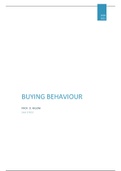Resume
Samenvatting buying behavior / koopgedrag
- Cours
- Buying Behavior
- Établissement
- Universiteit Gent (UGent)
Volledige samenvatting van het vak buying behavior. Alles zit erin verwerkt dus als je deze samenvatting leert heb je al het materiaal om een goed examen te maken!
[Montrer plus]



